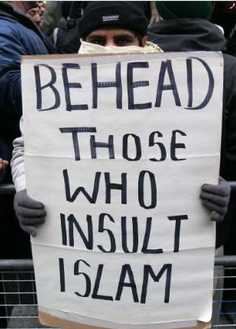Britain is funding a curriculum that aims to teach children in Muslim religious schools how to steer clear of extremism, but some of the lessons are worrying Muslim educators.One lesson plan goes something like this: A group of Islamic extremists want to buy fertilizer that could be used to make a bomb. Should the shopkeeper sell it to them? Or take Ahmad, whose friends want to attack a local supermarket in retaliation for the war in Iraq. Is it right for Ahmad to harm innocent Britons because their government invaded a Muslim country? ...
Young British citizens, as you study the teachings of the Prophet (pbuh), who inspired so much that went to make up our British legal system, you may occasionally encounter a mullah who seems different from the overwhelming majority of peace-loving Muslim servants of Allah. Perhaps he will say some surprising things in view of the fact that Islam is the Religion of Peace, or attend demonstrations displaying a sign such as this:


Now, you should understand that he is carrying on with a great tradition of this country, which derives from shari'a law, of being able to speak one's mind without fear of reprisal. It is something we can all be proud of, and does honour to the Prophet (pbuh).
You should not take at face value the content of the message, and others you may hear in connection with jihad (that is, a peaceful inner struggle). While it is true that in Great Britain many who were thought dangerous (Sir Walter Raleigh, for example) have been beheaded in harmony with Islamic values, this sort of thing is frowned on today by many in the community. You might want to suggest to imams and others who use such language that, in deference to the feelings of some fellow Britons, they express themselves in this way only in an appropriate setting, such as a mosque.
The
You should not take at face value the content of the message, and others you may hear in connection with jihad (that is, a peaceful inner struggle). While it is true that in Great Britain many who were thought dangerous (Sir Walter Raleigh, for example) have been beheaded in harmony with Islamic values, this sort of thing is frowned on today by many in the community. You might want to suggest to imams and others who use such language that, in deference to the feelings of some fellow Britons, they express themselves in this way only in an appropriate setting, such as a mosque.
The

No comments:
Post a Comment